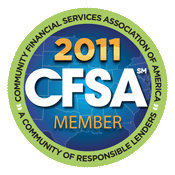Posted on 22 August 2011.
Gotta love it when critics compare payday loans to the Big Mac. In their eyes, a Big Mac can make you morbidly obese, causing you health problems and eventually leading to heart disease. Sure, when eating them excessively this may be true—but let’s not forget that a consumer has the choice to eat as many Big Macs as they want. And most dieticians would tell you that moderation is key to living a healthy lifestyle.
While Edward Ashworth, the guest columnist who wrote the op-ed that ran on NOLA.com, talks of APR and the “sky-high” fees that consumers pay when using a payday advance, what he’s forgetting to acknowledge are the responsible lenders—like CFSA members—who encourage responsible use of payday advances and provide clear and transparent product information so that customers can make informed decisions.
Here is Best Practice #1 that CFSA Members must adhere to:
“A member will comply with the disclosure requirements of the state in which the payday advance office is located and with federal disclosure requirements including the Federal Truth in Lending Act. A contract between a member and the customer must fully outline the terms of the payday advance transaction. Members agree to disclose the cost of the service fee both as a dollar amount and as an annual percentage rate (“APR”). A member, in compliance with CFSA guidelines where they do not conflict with applicable federal, state or local requirements, will further ensure full disclosure by making rates clearly visible to customers before they enter into the transaction process.”
The reality is that making ends meet is often a struggle, but the idea that it can all be cured if payday loans were eliminated is far from the truth. The fact of the matter is consumers are looking for greater convenience and less cost. There are many financial service providers offering short-term credit products, competing for consumers’ business—from banks, credit unions, payday lenders, and the like. In fact, some of the options are more expensive than payday loans. According to a study conducted by Pew Health Group’s Safe Checking in the Electronic Age, if an overdraft was treated like a short-term loan, with a repayment period of seven days, the APR for a typical incidence would be over 5,000 percent. Another interesting fact: The median amount a customer can be charged per day in overdraft fees is $140. In addition, Americans are estimated to spend $38 billion on overdraft fees in 2011, an all-time high, according to Moebs Services. And that’s not even getting to disclosures. While payday loan agreements are typically one to two pages, Pew found the median number of pages for a checking account disclosure is 111 pages.
So what’s more important: Access or information? We say both.
Consumers need access to information and options to help them cope with their individual circumstances. In the end, it should be informed consumers who decide what works for them, whether it’s going to a bank or credit union, utilizing a check cashing service, going the way of the prepaid card, or opting into a payday advance.
There’s no question that Americans are coming up short, struggling to make ends meet for several months at a time. It was just reported that 64 percent of Americans would utilize a source other than their savings account to satisfy a $1,000 unplanned expense. The survey also revealed that to resolve the problem, 17 percent of respondents indicated they would borrow the money from friends or family. That National Foundation for Credit Counseling’s release said that “asking those close to you for a loan can be awkward, and potentially negatively impact the relationship. Further, it can lead to “serial borrowing,” with the borrower always leaning on someone else to solve his or her financial problems.”
The bottom line is that if credit options were regulated out of existence or severely restricted, people would still come up short from time to time. If you eliminate access to one product, consumers will seek out another. And research shows it will likely be a more expensive and credit-damaging option.







